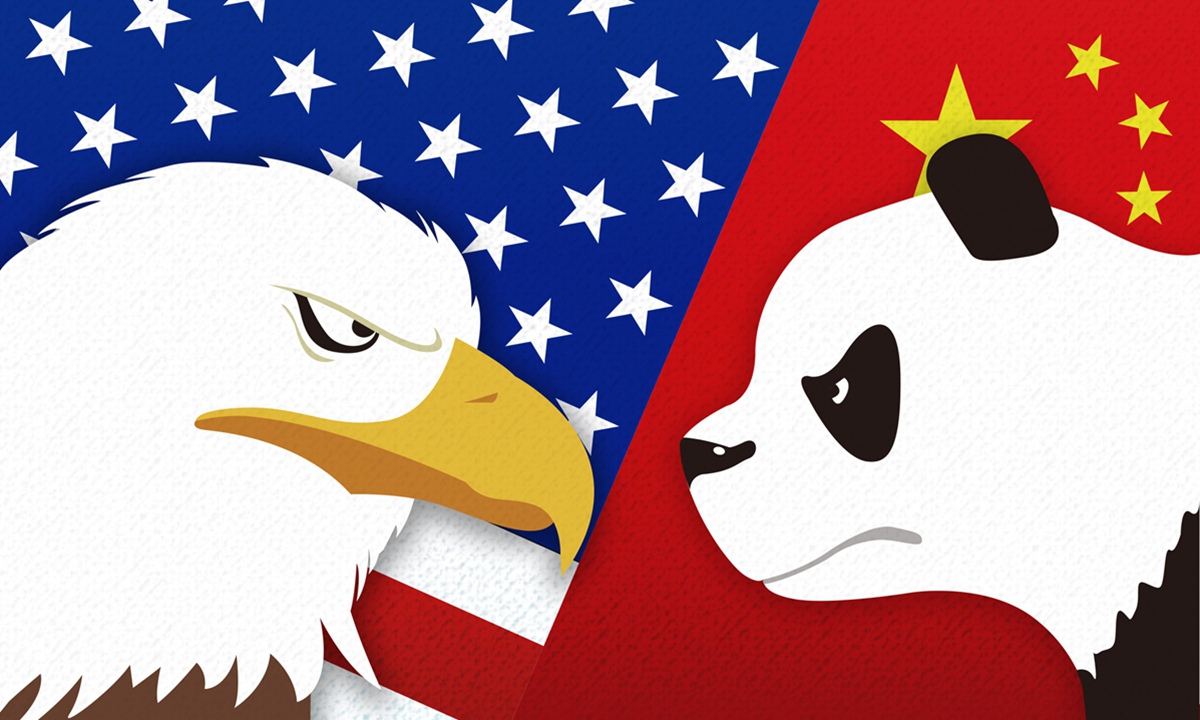China should tackle US’ ill intention to ‘block Xinjiang’: Global Times editorial

Illustration: Liu Rui
The US State Department, the Department of the Treasury, the Department of Commerce, the Department of Homeland Security, the Office of the Trade Representative and the Department of Labor on Tuesday jointly released a new warning to US businesses and individuals which still have supply chain and investment ties with entities in Xinjiang that are allegedly involved in "forced labor" and other "violations" of human rights, to avoid reputation, economic and legal risks.This is an update to a warning of business risks issued by the Trump administration in July 2020. The new warning was issued by more US departments and used stronger rhetoric with more specific content, including a list of 20 major industrial sectors. It is reported that the US government this week will issue risks warnings to companies operating in Hong Kong.
The warning issued on Xinjiang indicates that the US is determined to completely exclude Xinjiang from its supply chain. However, it may incur two results. First, by virtue of the warning's chilling effect, the US hopes to force other multinational enterprises abroad to follow suit. Second, Washington could exploit the "isolation of Xinjiang" to test whether it can further decouple its supply chain from China. Based on the results, the US could evaluate whether to take further actions.
Xinjiang's economy is not very dependent on the outside world. The impact of the US sanctions on Xinjiang can, to a large extent, be offset by the vitality of the Chinese market. But the US move is malicious and we must keep on high alert for its butterfly effect, in addition to be prepared for Washington's attacks on China's core industries and imposing sanctions over Xinjiang.
China must adopt the same attitude it assumed during the trade war, namely "not willing to engage in a trade war, but also not afraid of the confrontation, and fighting back when necessary." Take Xinjiang cotton. It is the product most deeply involved in the international supply chain and China is the world's largest cotton fabric consumer market. China has to have the courage to fight and defend its rights. We need to be bold in asking some clothing brands to continue to use Xinjiang cotton in producing their goods sold in China based on specific circumstances. We should remain hard against tough demands from the US. Because of the large scale and potential of China's cotton market, some US companies will suffer huge losses from being forced to choose between countries. Some companies will eventually have to discard the US market in order to stay in the Chinese market. This will hit hard Washington's arrogance.
China should not allow US companies to exclude Xinjiang products in other sectors of the economy. US companies which insist on doing so should be listed as unreliable entities. As for the sanctions against Xinjiang companies which the US government alleges are involved in "forced labor" and other human rights "violations," they are motivated by market competition on one hand. But on the other, there is legal room for struggle. China should not easily give up and indulge Washington's wanton acts.
China's consumer market is already on par with that of the US, which means that decoupling will be painful for US businesses. Other countries, including most US allies, have little interest in seeing their companies suffer from decoupling from China and we need to use this as leverage to compete with the US.
Washington has shown its ambition to contain the development of China's economy. The US economy has been generally stronger than China's and it has high-tech advantages, like microchips, to intimidate the world. The situation China encounters is severe. Our advantage is that our existing markets are broadly comparable to those of the US. China has been the top trading partner for more than 120 countries and regions and our growth potential has been unleashed at a rapid rate. We are maintaining the status quo and expanding the interests of cooperation between China and the world. But the US is trying to reshape the scenario and force companies from all countries to take losses. It has to use all its strength and it is bound to be a tough process.
This is a key battle. On one hand, it depends on the appropriate use of tactics. On the other, it depends on whether we can expand our market more rapidly. We should try to make major progress in expanding the market in the years to come and strength the will and confidence of all countries to work with China. This will deal a heavy blow to the US decoupling strategy.
If we win this battle, we will reshape the world's expectation toward China-US competition. The world will have a favorable view of China. The US policy of isolating China will make the world ostracize the US.


